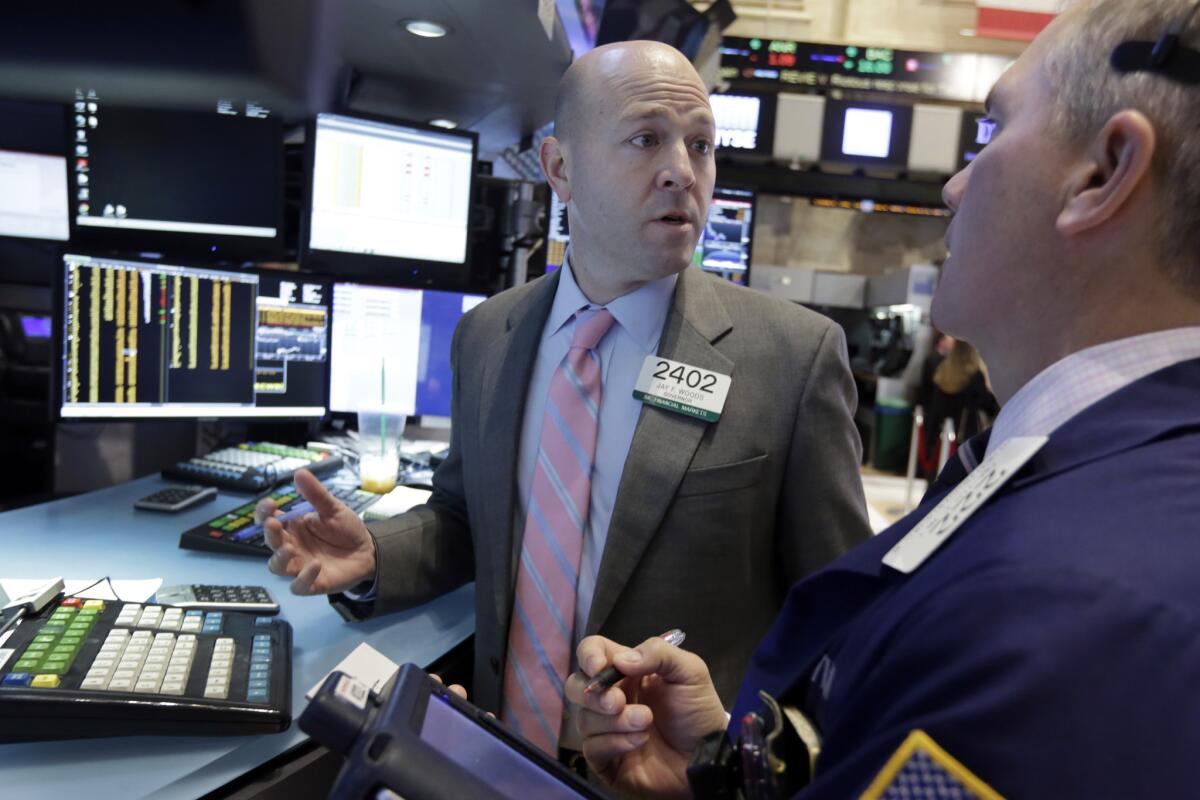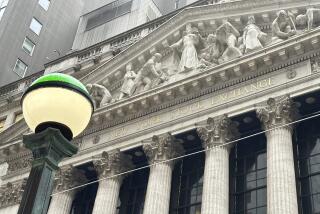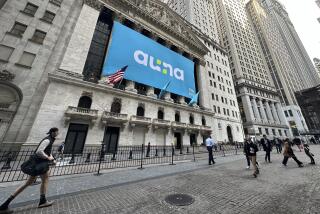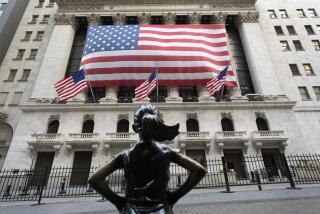Stocks, bonds drop sharply as strong jobs report raises prospect for a rate hike

A strong jobs report shook up the financial markets Friday.
U.S. employers added 295,000 jobs last month, the government said. That was more than economists were expecting and, combined with a drop in the unemployment rate, raised the likelihood of the Federal Reserve raising interest rates sooner than had been expected.
The dollar surged and Treasuries fell as investors factored in the possibility that the Fed could implement its first rate hike in almost a decade as soon as June. The prospects of higher interest rates sent stocks tumbling. The market logged its worst day in two months.
Fed policy makers have held interest rates close to zero for more than six years in an effort to stimulate growth and boost the economy. That stimulus has helped underpin a six-year bull market in stocks.
“We’re moving to another chapter here,” said Jim Russell, a portfolio manager at Bahl and Gaynor, a wealth manager. “Certainly, the number does put pressure on the Fed to move.”
The Standard & Poor’s 500 index fell 29.78 points, or 1.4%, to 2,071.26. The Dow Jones industrial average dropped 278.94 points, or 1.5%, to 17,856.78. The Nasdaq composite fell 55.44 points, or 1.1%, to 4,927.37.
Stocks opened lower and the losses accelerated throughout the day. By the close of trading the S&P 500 index had logged its biggest one-day loss since Jan. 5.
Government bonds fell as investors factored in a higher probability of a summer rate hike. The yield on the benchmark 10-year Treasury note jumped to 2.25% from 2.12% late Thursday.
Stocks that pay rich dividends, such as utilities, telecommunication companies and real estate investment companies, slumped the most. These stocks have been popular while interest rates on bonds have remained low. If interest rates on bonds rise, they become less attractive by comparison. The Dow Jones utility average plunged 3.1%. It’s down 7.8% this year.
Some investors said that the sharp sell-off was an overreaction.
“The Fed is not going to raise interest rates from zero to 5% overnight,” said Kevin Mahn, Chief Investment Officer of Hennion & Walsh Asset Management.
Mahn said that investors should remember that if interest rates are going up, it’s because the economy is getting stronger, and while rates may rise this year, they remain low by historical standards.
Financial stocks were among those that fared better Friday, logging the smallest loss in the S&P 500 index.
Higher interest rates are generally good for financial companies, such as banks, because they can lend at higher rates. Banks also rose a day after the Federal Reserve announced that all major U.S. lenders had passed the Fed’s annual stress tests, which are designed to gauge whether lenders are strong enough to withstand severe disruptions to the financial system. Bank of America rose 22 cents, or 1.4%, to $16.22, one of the biggest gains in the S&P 500.
Apple was another stock that managed to buck the trend and eke out a small gain.
The company will replace AT&T in the Dow Jones industrial average on March 19, S&P Dow Jones, the manager of the index, said Friday. The manager cast the move as a sort of a housekeeping maneuver, a way of ensuring that the index better reflects the U.S. economy and markets.
Apple, the world’s most valuable publicly traded company, gained 19 cents, or 0.2%, to $126.60. The company’s market value is about $736 billion, according to FactSet Research Systems Inc. data.
The dollar jumped after the release of the job figures as traders priced in an earlier rate hike. The euro, already at 12-year lows, slid to $1.0848. The dollar also rose against the Japanese yen, climbing to 120.72 yen.
While a stronger dollar is a boon to U.S. consumers because it helps make imported goods less expensive, it is a burden to big companies that rely on overseas sales for a lot of their revenue.
Global corporations from Coca-Cola to Avon Products have said this year that their earnings have been affected by the strengthening U.S. currency. A rising dollar means that the sales they make abroad are worth less in dollar terms.
In energy trading, the price of U.S. oil fell sharply after the strong jobs report pushed up the value of the dollar. That made oil a less attractive investment for overseas buyers.
Benchmark U.S. crude fell $1.15 to close at $49.61 a barrel in New York. Oil finished the week down 25 cents. Brent crude, a benchmark for international oils used by many U.S. refineries, fell 75 cents to close at $59.73 a barrel in London.
Precious and industrial metals futures fell sharply. Gold fell $31.90 to $1,164.30 an ounce, silver fell 35 cents to $15.81 an ounce and copper lost four cents to $2.61 a pound.






